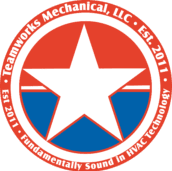Boiler Troubleshooting & Common Issues: A Comprehensive Guide
When it comes to maintaining a comfortable and cozy living space, a well-functioning boiler is essential, especially during the chilly months. However, like any mechanical system, boilers are susceptible to issues that can disrupt their efficiency and performance. Understanding common boiler problems and troubleshooting techniques can save you from potential inconveniences and expensive boiler repair costs over time.
Common Boiler Problems & Repairs
In this blog post, Teamworks Mechanical highlights some of the most typical boiler issues and provide guidance on how to troubleshoot them effectively.
Low Water Pressure
Low water pressure is a common problem that can affect boiler functionality. If you notice weak water flow from your taps or radiators, the boiler's pressure may be insufficient. The first step in troubleshooting this issue is to check the boiler's pressure gauge. Typically, the pressure should be between 1 and 1.5 bar.
To address low water pressure, you can try repressurizing the system. Locate the filling loop, which is usually a flexible hose with two valves, and follow the manufacturer's instructions to increase the pressure. If you're unsure about this process, it's best to consult a qualified heating engineer.
Leaking Boiler
A leaking boiler can cause significant damage if left unattended. Leaks are often caused by issues with internal components, such as faulty seals, corroded pipes, or a malfunctioning pressure relief valve. If you notice water pooling around your boiler or damp patches on the walls nearby, it's crucial to address the problem promptly.
In the case of a leak, it's essential to shut off the boiler and the water supply immediately. Then, contact a professional heating engineer to inspect and repair the boiler to prevent further damage.
Strange Noises
Unusual noises coming from the boiler can be a sign of various problems. Common sounds include banging, gurgling, or whistling. These noises are typically caused by issues like air in the system, kettling (the buildup of limescale), combustion or a malfunctioning pump.
If you hear strange noises, try bleeding the radiators to release any trapped air. If the issue persists, it's best to have a qualified engineer examine the boiler to diagnose and fix the problem.
Pilot Light Issues
If your boiler relies on a pilot light, a malfunctioning light can cause your boiler to fail to ignite. This may be due to a faulty thermocouple, a clogged pilot orifice, or problems with the gas supply.
Before attempting to relight the pilot light, carefully follow the manufacturer's instructions. If the pilot light continues to go out or won't stay lit, it's time to call a professional to inspect and repair the boiler.
Boiler Keeps Turning Off
If your boiler repeatedly shuts down, it might be experiencing overheating issues. This could be due to low water pressure, a faulty thermostat, or a damaged pump. First, check the water pressure and ensure it's within the recommended range. If the pressure is correct, you may need to recalibrate or replace the thermostat or seek professional help for a thorough inspection.
Properly maintaining your boiler and being aware of common issues can significantly extend its lifespan and keep it running efficiently. Regularly checking water pressure, bleeding radiators, and paying attention to any strange noises or leaks are essential aspects of boiler maintenance.
However, when faced with complex problems or concerns beyond your expertise, always seek the assistance of a qualified heating engineer to ensure the safety and functionality of your boiler system. By addressing issues promptly, you can avoid costly repairs and ensure your home remains warm and comfortable all year round.




















